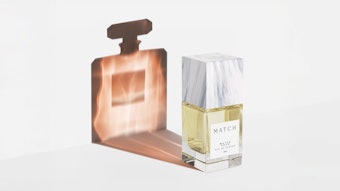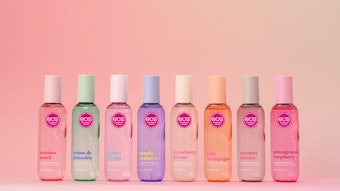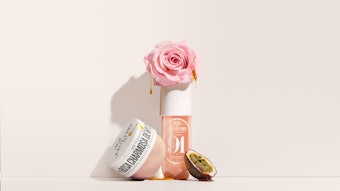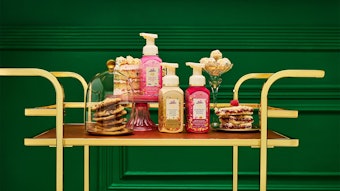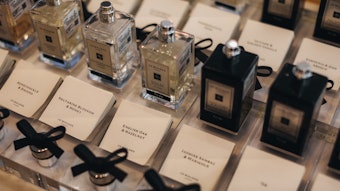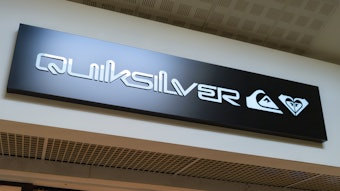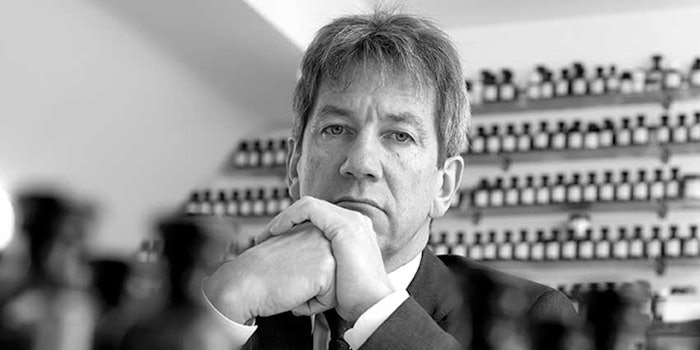
When you ask John Stephen what he is most proud of in life, the answer he gives is getting a PPL-IR (a private pilot instrument rating license). It is a license that only a few private pilots earn, allowing the use of commercial flight paths and blind flight through clouds. He first spent 10 years jumping out of planes, after a pub dare in 1980 turned into a real obsession. Eventually, he decided to fly too.
“I flew Luca Turin and Chandler Burr to France, and we traveled around together like the terrible three,” said John. “The owner of Fragonard, François, has a beautiful cottage on the hills of Grasse, and we spent most of our days trying to work out what to have for dinner that night,” John laughed. “The life they lead is quite something else; quite luxurious. I’d ask if we could talk about the fragrances yet and François would say ‘later, later.’”
John successfully pitched one of his perfumes, with the aid of Luca Turin, to be considered for the selection at Fragonard, but the board of directors had not initially warmed to the idea: “They chose my fragrance but the board was quite split. I was going against a French supplier, and the French buying perfume from an English perfumer wasn’t an easy pitch. I had Luca on my side and that made all the difference in the end.”
John is most known in the U.K. for creating fragrances for the English heritage barbershop and grooming brand Czech & Speake, and for owning and running the Cotswold Perfumery at the chocolate box village of Bourton on the Water.
“The location has definitely made a difference. This is such a place for tourists, and in the early years, the shop was the business. The growth of that has enabled everything else, and now the other side of the business is much bigger,” explained John—the other side being independent perfumery for niche brands, wealthy individuals and own brand products, as well as running his short perfume-making courses.
Exactly how John ended up flying around France with renowned fragrance folk, and having his own laboratory atop an idyllic cottage at the Cotswolds, is not a typical story of a perfumer.
A Bottle of Perfume with Four Gallons of Petrol
John's parents were based in the Cotswolds. His father was a textbook example of a larger-than-life character: He set up new business deals after another and sweet-talked his way into and out of situations. John and his sister did not entirely understand their mother’s reluctance to support yet another hare-brained idea. “We used to wonder why mother was so negative about dad’s new ideas,” said John. “We didn’t understand at the time what he was really doing and just loved the fact he was always coming up with something.”
And come up with ideas he did: African violets, off-peak strawberries, paint that could kill flies when landed upon… and perfume.
“I think perfume was one of his last-ditch efforts to avoid his other business ideas and unfinished deals catching up on him,” said John. “Because he had a chat with his solicitor [lawyer] who said 'you know, if you’re not careful, you could go to prison for some of this.' He'd seen Avon and looked at various ways of selling large volumes of perfume and came up with an idea.”
What was the brilliant idea that would get all his debts paid and save him? Regent Petrol had a major presence in the U.K. at the time, with plenty of petrol stations. They ran a promotion: a gift with purchase for every four gallons of petrol. “Dad said ‘you know, we could offer them a bottle of perfume as the gift,” explained John. “And so he did some calculations, and worked out he’d need 800,000 bottles of perfume just for the first order. So he went and bought 800,000 sample sized bottles, and we got busy labeling and filling them up. He explained to us it would be important to be ready. He went to see them only after we had done all of that.”
The 800,000 perfume samplers were left unsold.
The DIY Approach
“Mum was left running things, and we helped, but by the time dad went to prison, I was off to University. I was 17,” explained John. “Life was quite chaotic back then—and we had one shop and no money, so mum was working really hard to make something out of it. We only had one chance. Mum got the money and the original perfumery was bought for £6,000 in 1966.”
The current Cotswold Perfumery is not at the business' original location—the original shop was smaller and on the river, and there was a separate lab a quarter of a mile away.
“I would make perfume and help out as much as I could. Of course, back then I had no idea what I was doing, so I made some really terrible perfumes, but then you didn’t have any regulations to worry about either,” John laughed. “You could do pretty much what you wanted.”
John initially set off studying electrical engineering on a sandwich course—a period working in the industry. “I looked at the other electrical engineers and thought, 'do I really want to end up living my life just like these people?'” said John. “I changed direction completely and did sociology. After I finished my degree, mum died. It was 1975 [when] I took over running of the business. I quickly realized how much chemistry you need. I started reading about it, and gradually learning more.”
John has since qualified as a chartered chemist, mainly to fulfill the requirements of cosmetics regulations and local trading standards—he did not want to have to use other people to check product safety. In fact, a kind of do-everything-yourself approach is central to how John has lived his life, even down to his shop fittings and hobbies. While originally driven by necessity (he did not have the funds to fit his shop out, or have enough staff to help sweep the floors in the beginning)—the ethos stuck.
When the current premises became available, John approached a local bank. He dreamed of having everything in one place and designing a bespoke perfume lab space for himself on the top floor. No more running back and forth between buildings to check stock levels—something he had gotten used to in the days before computers and the internet.
When the bank stalled on his loan until the last minute, John approached every other local bank with a business plan and forecasts and got his loan—only to find out that the family selling the property was impatient and set a challenge for buyers: the first one to bring in a contract wins.
“I ran down to the local solicitor and told him the situation. 'How quickly can you get it done?' He said, 'well, in about three weeks,” said John. “I wandered back to the perfumery slowly with my head down and thought, now what? Then it occurred to me—I’m going to see what there is out there about conveyancing, and I remember it being 4 o’clock at the time. So I raced to Cheltenham and bought a book on it. I stayed up all night and by the morning, I’d written my own contract.”
First thing in the morning, John marched to a local solicitor to be verified, then headed to the owner of the prospective new perfumery premises: “I went to see Gordon at 10 a.m. the next day, handed him the contract and said, ‘here you are.’ His jaw dropped.”
From a Local Shop to Global Perfumery
Initially, the shop in Bourton on the Water and the range of fragrances sold within was the scope of the business. John’s experimentation in the early years resulted in the development of a core range of classic fragrances—fougere, oriental, aldehydic, floral—covering most basic fragrance families. The range has evolved over the years, though is currently in need of an update. “It’s one of those things that keeps niggling at the back of your mind—the perfumes and the packaging both need an update, but we’ve been so busy with other work that it always slips down on the list of things-to-do,” explained John. “And were I to update the fragrances, we’d disappoint all the current customers—I might have to do a second range.”
When an approach was made by Czech & Speake, leading to a fruitful relationship and several successful fragrances, the rest was history: “You know what this industry is like, once people know you and what you can do, the word of mouth spreads,” said John.
The regulatory side of running a small perfume business has been the biggest change over the years. “A perfumer working for a large supplier doesn’t have to know the details or deal with it to the degree I have to,” explained John. “They might have six full timers running a regulatory department and with us, it’s just me.”
The demands are just the same; there are no exceptions for small businesses. This is something John really focuses on during his Level Two perfumery course (the more advanced day, aimed at people seriously considering perfumery as a career). The life of an artisanal or independent perfumer is quite different to that of a corporate one, though few wear quite as many hats as John does.
Perfumery in One Day
“I was approached by W.H. Smith. They asked if I would do a one-day course for them to teach people how to make perfume. I said ‘Don’t be so stupid—you can’t possibly do it in a day. Goodbye.’”
Four months later, W.H. Smith were back: “They begged me to do something, as they hadn’t found anyone else and they had so many people asking.”
John went away to think about what he could do in a day and developed an entry level introductory day to perfumery, suitable for all skill levels. The course became available via W.H. Smith, but after the first year, difficulties with administration frustrated John to a point where he did not want to renew the contract: “I’d get people calling me and asking where the course details were; whether their booking had really been confirmed; all sorts of things. I’d have five people turning up for a 10-person course one day—and then another 15. People arrived, already angry,” explained John.
John adapted the course and developed an additional day for people who want to go beyond a hobby or a nice day out—and thus launched his Cotswold Perfumery courses.
The first day could, indeed, be attended by almost anyone—though some degree of numeracy and ability to understand proportions are needed. Even with the basic course, John still takes care to introduce the fragrance families, the lingo of perfumery, and the methods of raw material production before you get to blend. The blending happens with a set of pre-selected and pre-diluted materials, by drop. Participants leave with a bottle of finished perfume at the end of the day, which makes the day a self-contained package.
The second day is mostly spent on the business side of perfumery—and on regulatory. It includes further blending and discussion on formulation, but the day is almost intended to act as a toolkit for those genuinely determined to find out more, and as a warning—essentially asking, "are you sure you want to take all of this on?"
“I’ve had about 25% of those who complete the level one course go on to do level two,” explained John. “I do sometimes get students who are terrified of numbers, and it can be hard to help them in the time available.”
The Ones Who Stop to Smell the Flowers
In the time John has been involved with perfumery, a great deal has changed. Access to information and to supplies of raw materials looks nothing like they did a few decades ago. “In the beginning, I had to beg people to supply me. I’d found a supplier who sent me a catalog, but they’d quoted the wrong prices for my small half a kilo orders and were almost not going to sell to me. I had to really plead with them,” explained John.
Consumers, perfume enthusiasts and wannabe-perfumers alike now have access to much more information than before—some of the information is not accurate, or is not interpreted correctly. There is still a fair amount of deliberate obfuscation out there too.
As someone who encounters so many industry hopefuls, John has formed opinions on who really has the potential to become a perfumer.
“I think you need passion. I think you need to be in love with the sense of smell and have a certain joy about smelling things; an excitement. You need to be excited by and interested in everything—you know, the type who goes for a walk and stops to smell the flowers,” said John.
“If you have that love of it first, it gets you through all the hard work.
“Second, you have to have an eye. The same way someone might be really interested in fashion but not have an instinct for what goes well together—it’s the same with smell. I think the technical knowledge—you just knuckle down and learn it. That’s the easiest bit, really, even though it is, of course, very hard.
“You need to overcome whatever it is that is holding you back,” said John. “You need to have obsession and determination.”
Rarely is it as easy to say that someone practices what they preach.


